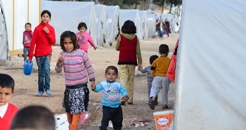 Made for goodness: A faithful response to the refugee crisis
Made for goodness: A faithful response to the refugee crisis
Briefing produced by the Joint Public Issues Team: Baptist, Church of Scotland, Methodist and United Reformed Churches working together:
"A Christian response to the unfolding refugee crisis must begin with an acknowledgement that there is no outsider. Neither geography nor legal status can deny a person access to God’s family, nor do they afford other people a privileged status in God’s family.
"But our understanding that we all have a common identity in God is profoundly at odds with the prevailing rhetoric around migrants. The divisive rhetoric of the recent EU referendum campaign symbolised by the infamous “Breaking Point” poster is the most recent example of migrants and refugees being presented as an “other” group different from ordinary people. There is strong public narrative that promotes the image of refugees as a threat, an economic drain and a major cause of the problems faced by disadvantaged people in the UK, which often overwhelms the essential truth that these are valued and loved members of God’s human family.
"In September 2015 the publication of images of the body of a toddler, Alan Kurdi (sometimes reported as Aylan Kurdi), washed ashore on the Turkish coast, horrifically demonstrated the humanity of the refugee crisis. A Syrian refugee crisis which to many seemed distant, now had the face of a young child. In the aftermath of this, public opinion moved and the Government responded with some small but positive changes in policy.
"But Alan’s story, tragic as it is, forms just a part of an unprecedented global refugee catastrophe. 65 million people are now either a refugee, internally displaced or seeking asylum. That’s one in every 113 people. People are fleeing violence, conflict and poverty not only in Syria, but also in Yemen, Iraq, the Central African Republic, South Sudan, Burundi and many other places. This catastrophe has led to significant increases in population in Turkey and other countries, and to official and unofficial refugee camps within Europe, for example in France, Greece and Italy. This is a humanitarian disaster which has been building over many years and crosses national boundaries.
"Forced migrants are some of the most vulnerable people on earth. Having encountered hardship or persecution in their country of origin they have the additional upheaval of leaving their homes in search of a safer existence. The vast majority of refugees, asylum seekers and others seeking sanctuary are now living in developing countries. For those people who do make it to the European continent, the chaotic and unpredictable nature of the various European asylum systems has resulted in unaccompanied children going missing, families being separated and, for an increasing number of unsuccessful applicants, destitution.
"Churches and other groups have responded across Europe welcoming refugees and providing practical support. But the challenge of providing long term sustainable solutions for those displaced by poverty and conflict remain.The refugee catastrophe requires a political response as well as a practical one.
"On 23 June 2016, the UK voted to leave the European Union. The exact consequences of this decision remain uncertain, but it is clear is that we are about to embark upon an inevitable process of change, that is likely to have profound implications for the way our Government responds to the refugee crisis.
"As Christians, we have a key role to play in the upcoming months and years, highlighting the ongoing plight of refugees and displaced people. We must affirm the case for a human response to the crisis, which recognises that we are all made for goodness, and that the human dignity of refugees is intimately connected to our own. This briefing looks at the history and consequences of the current humanitarian crisis and highlights four specific areas that Churches can engage with and campaign on.
Download the briefing here
Retweet about this article:
Joint Public Issues Team: Baptist, CoS, Meth., URC, 09/08/2016